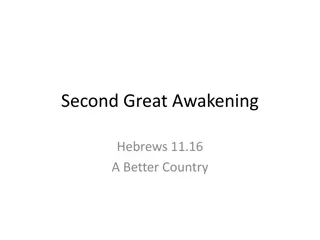Supporters of Slavery in the 19th Century: Legal, Religious, and Economic Arguments
In the 19th century, defenders of slavery utilized legal arguments by denying citizenship rights to blacks, religious arguments by justifying ownership and guidance through biblical references, and economic arguments by comparing treatment of slaves in the South to conditions of workers in the North. These supporters sought to cement the institution of slavery by weaving a narrative of legality, religious duty, and economic necessity.
Download Presentation

Please find below an Image/Link to download the presentation.
The content on the website is provided AS IS for your information and personal use only. It may not be sold, licensed, or shared on other websites without obtaining consent from the author.If you encounter any issues during the download, it is possible that the publisher has removed the file from their server.
You are allowed to download the files provided on this website for personal or commercial use, subject to the condition that they are used lawfully. All files are the property of their respective owners.
The content on the website is provided AS IS for your information and personal use only. It may not be sold, licensed, or shared on other websites without obtaining consent from the author.
E N D
Presentation Transcript
Examine the ways in which supporters of slavery in the 19thcentury used legal, religious and economic arguments in its defense. A Three Point Blueprint
Legal argument: Nowhere in the United States were blacks given citizenship rights. The precedent was set legally that blacks could be considered property (Dred Scott Decision) For purposes of census / population numbers, blacks were counted as 2/3 of a person. Blacks had no legal standing in the courts. The Constitution protected slave holders rights to their property.
Religious argument: Slaves were taken care of by their owners and were much better off than the Northern wage slaves. Without the guidance of the white slave master, Africans would not have been introduced to Christianity and would continue in their savagery. Southerners would use biblical passages to support this belief: Abraham had slaves The Ten Commandments: "Thou shalt not covet thy neighbor's house, ... nor his manservant, nor his maidservant." "slaves, obey your earthly masters with fear and trembling" (Ephesians 6:5) "tell slaves to be submissive to their masters and to give satisfaction in every respect" (Titus 2:9) Slaves, obey your earthly masters in everything; and do it, not only when their eye is on you and to win their favor, but with sincerity of heart and reverence for the Lord (Colossians 3:22)
Economic argument: Northern blacks (and whites) were slaves to wages (their pay). In 1850 the average worker had to work 16 hour days for 16 cents an hour. Southern plantation owners argued that the slave on their plantation had better conditions than the slums of Northern cities. Slave owners took care food, housing, medical needs, etc. while the poor workers in the North lived in squalor. Without slavery, the economic system of the South would crumble, hurting both the South and the North (higher cotton prices = damages the profitability of Northern factories). Without slavery, free blacks would then compete with whites for jobs (Herrenvolk democracy).























